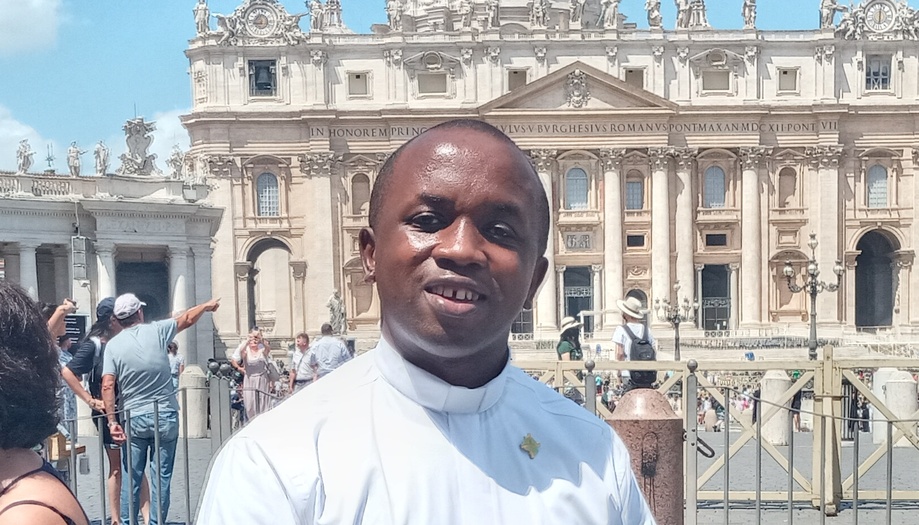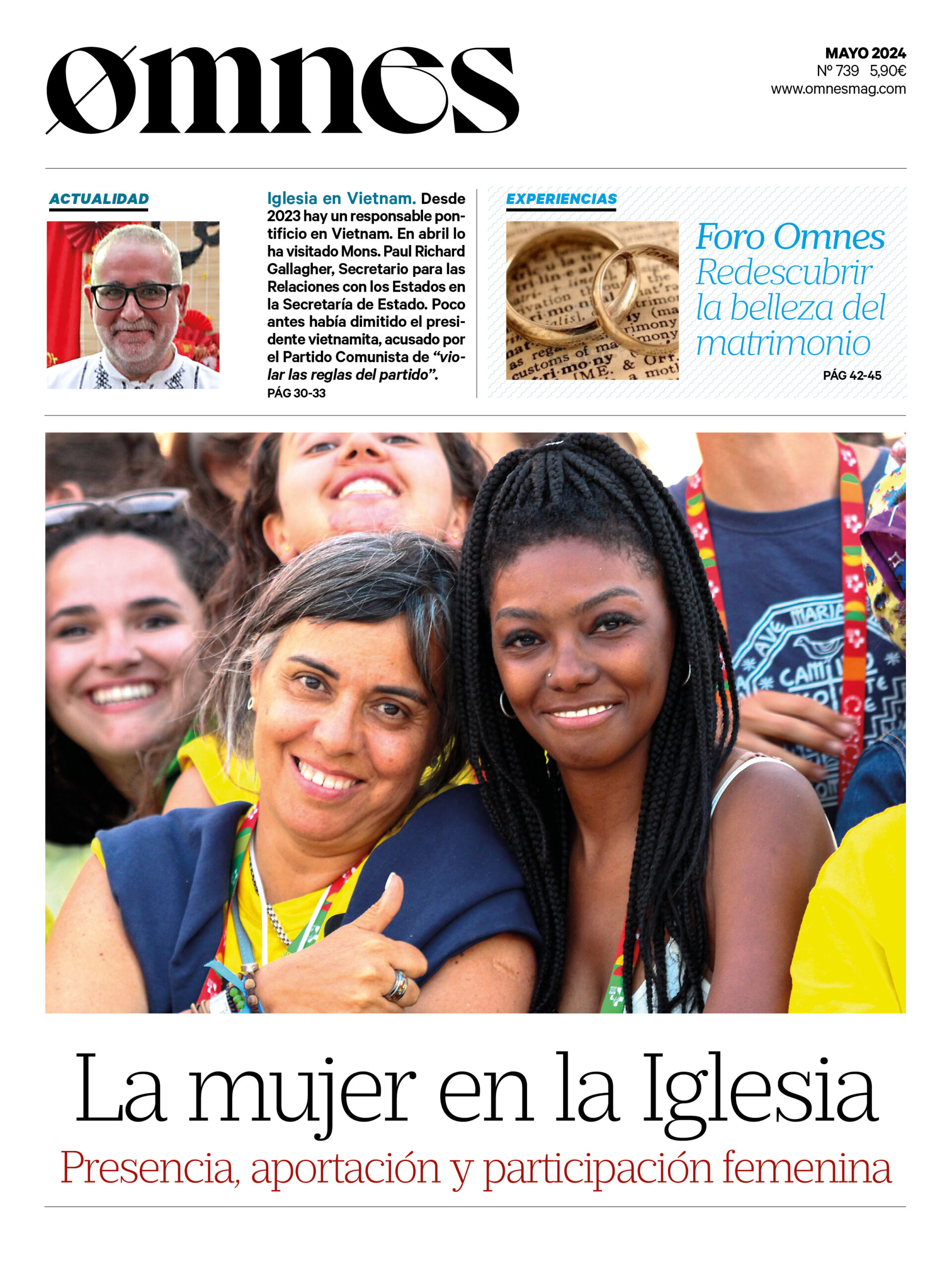




















On Sunday, April 21, we celebrate Native Vocations Day, organized by the Pontifical Mission Societies to raise funds to support vocations emerging in the mission territories. The specific web page for this day can be found at here.
As an example of a native vocation, Omnes interviewed Father Innocent Chaula. A native of TanzaniaHe felt the call to a vocation when he was very young. He is currently studying at the Ecclesiastical University of San Damaso, in Madrid, and will return to his diocese of origin when he finishes his formation. In this interview, he talks about the situation of native vocations in his country and the importance of Pontifical Mission Societies in helping these vocations. Currently, PMS supports 725 seminaries in the world and the economic aid for the year 2023 amounted to 16,247,679.16 €.
What was your vocation process like?
I was born in Njombe, Tanzania, in 1983 in a half Christian and half pagan family. I felt the priestly vocation when I was very young, 5 years old, it seemed like a joke. Thanks to the work of the Consolata Missionaries, in particular Father Camillo Calliari IMC, and the faith of my mother, the call progressed step by step until the time I wrote the letter to be formed as a diocesan seminarian of the diocese of Njombe.
My priestly formation began at the minor seminary of St. Joseph - Kilocha in Njombe and then at the major seminary of St. Augustine-Peramiho in Songea. I was ordained in 2014. I am now studying dogmatic theology at the Ecclesiastical University of San Damaso in Madrid.
What is the current status of native vocations in Tanzania?
Thanks to the Lord, we have many native vocations in Tanzania. We have seven major seminaries (one built 6 years ago) with more than 1500 seminarians, 25 minor seminaries, and more than 86 religious congregations with more than 12000 religious.
What is the work of OMP in relation to these vocations?
The Pontifical Mission Societies has a branch, the Work of St. Peter the Apostle, which is a missionary service of the Church aimed at supporting vocations arising in mission territories. The Work of St. Peter the Apostle (POSPA) was created to support the indigenous clergy. Its mission is to accompany numerous young men who wish to respond to their call to the priesthood or consecrated life, but who do not have the necessary resources to complete their formation.
In relation to these vocations, he helps us in several ways: with prayer, praying for native vocations. That is their first help, because it is a network of prayers for this cause; and with financial or material support for the following:
-Building/rehabilitating major and minor seminaries and training centers.
-Scholarships for seminarians, to help with the ordinary expenses of life in the seminary and in the formation centers (propaedeutic seminaries in the dioceses and novitiates in the congregations).
-Stipends for formators of major and minor seminaries.
How is Native Vocations Day celebrated in Tanzania?
Let us collaborate with the Pontifical Work of St. Peter and make a week of preparation for the day by inviting everyone to pray for vocations (like a novena). This is done in parishes as well as in small Christian communities and families.
On the same day, many parishioners make a contribution or collection to support native vocations. Because they are poor, the donations are very small. Instead of contributing a lot of money, people make a donation of food from their farms. That is the wealth that many people have in the villages. Most of the donations are cows, goats, chickens, rice, corn, beans, fruits of all kinds. Therefore, it is necessary for the diocese or parish to have a truck or van to take everything from the villages to the seminary or formation center.
The ability to give and collaborate is not measured only by the amount of money or goods that someone possesses, but by the willingness and the heart with which one offers. It is important to know that even if people are poor, they are willing to contribute what they have.
What pastoral challenges do you perceive in your country so that vocations can continue to grow?
In Tanzania, the Catholic Church faces a number of pastoral challenges so that vocations can continue to grow. Some of these challenges include:
-Poverty and lack of resources: Many areas of Tanzania are poor, which can limit access to the education and formation necessary for religious vocations. Lack of financial resources to support seminarians and candidates for religious life can be a significant obstacle.
-Access to education and training: In some regions, access to quality education and religious formation programs may be limited. This makes it difficult to adequately prepare young people who wish to pursue a religious vocation.
-Cultural and social pressure: In some communities, there is cultural and social pressure that discourages the choice of religious or priestly life. Young people may face resistance or lack of understanding from their families and communities when expressing their desire to pursue a religious vocation.
-Interaction with other religions: Tanzania is a religiously diverse country, with a mix of Christianity, Islam and indigenous traditions. The Catholic Church must find ways to dialogue with other religions and cultures in a respectful and constructive manner.
-Cultural change and secularization: As elsewhere in the world, Tanzania also faces the challenge of secularization and cultural change, which may influence the decline of religious vocations. Modern society and its values may compete with vocational calls.
What do you think are the reasons why there are more vocations in Africa than in Europe?
This could be due to several factors:
-Family and youth ministry: Effective family and youth ministry in Tanzania not only strengthens people's faith and spiritual lives, but also creates an environment conducive to the flourishing of native vocations. By focusing on holistic formation, accompaniment, faith education and active vocation promotion, the Church in Tanzania can inspire and guide more young people to follow their call to serve God and the community.
-Strength of faith: In many African countries, the Catholic faith is an integral part of the daily and cultural life of the communities. This strength of faith can inspire more young people to consider religious or priestly life.
-Need for pastoral service: In rural and less developed areas, the need for pastoral services is high. This may motivate more people to respond to the call to serve their communities as priests or religious.
-Socioeconomic context: In Europe, society has undergone significant socioeconomic changes, including an increase in secularism and a decline in religious practice in some regions. In contrast, in Tanzania and other African countries, religion remains an important part of cultural and social identity.
-Youth Population: Tanzania has a young population, with many young people searching for purpose and meaning in their lives. Religious life can offer them a meaningful way to live their faith and serve others.
-Community support: In many African communities, there is strong community support for those who choose religious or priestly life. This support can encourage more young people to follow this path.
-Access to resources: Although resources may be limited compared to Europe, community solidarity and the support of missionary organizations such as the Pontifical Work of St. Peter can help overcome these challenges and facilitate the formation of vocations.
It is important to note that each country and culture has its own unique context, and religious vocations are influenced by a variety of factors. What is certain is that in both Tanzania and Europe, religious vocations are a testimony to God's call and the desire of individuals to live their faith in a committed way and serve the Church and the community.












